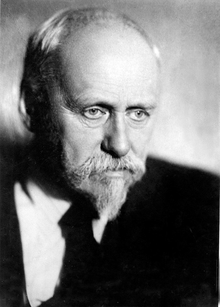Vladimir Leontyevich Komarov (Russian: Влади́мир Лео́нтьевич Комаро́в; 13 October [O.S. 1 October] 1869 – 5 December 1945) was a Russian and Soviet botanist.
Vladimir Komarov | |
|---|---|
Владимир Комаров | |
 Komarov in 1944 | |
| Born | 13 October 1869 |
| Died | 5 December 1945 (aged 76) |
| Scientific career | |
| Fields | Botany |
| Signature | |
Biography
editKomarov was born in 1869.[1] He was a graduate of St. Petersburg University where he received a degree in botany in 1894.[1] From 1895 until 1899 he was co-editor of the exsiccata Fungi Rossiae exsiccati.[2] He worked as a professor at the university in the period 1898–1934.[1]
From the memories N.Poppe: One day in spring 1937 my aide Kazakevich and I received an order to prepare ourselves for a journey to Mongolia from the president of the Academy of Sciences, V. L. Komarov, a famous botanist and head of the Mongolian Commission. The Mongolian government, through the Foreign Service, had asked the academy to send scholars to conduct field work. Neither of us was enthusiastic about the journey, foreseeing nothing but trouble, but after an interview with Komarov we accepted this assignment with great reluctance. Several weeks later we were summoned to Komarov who told us that exit permits had been denied to both of us, and then he added, "We thought both of you to be loyal citizens of the Soviet Union and chose you as prospective members of the expedition." This was certainly a remark unworthy of the president of the academy. He had no right to talk to us in that manner, completely disregarding the fact that Kazakevich was a senior research scholar and I had been a corresponding member of the academy since 1932.
Until his death in 1945, he was senior editor of the Flora SSSR (Flora of the USSR), in full comprising 30 volumes published between 1934 and 1960.[3] He was elected a corresponding member of the Russian Academy of Sciences in 1914 and its full member in 1920.[1] He served as President of the Academy of Sciences of the USSR in 1936–1945.[1] He was a deputy at the Supreme Soviet from 1938 to 1945.[1]
Awards and legacy
editKomarov was awarded the Stalin Prize in 1941 and 1942 and the Hero of Socialist Labour in 1943.[1]
The Komarov Botanical Institute and its associated Komarov Botanical Garden in Saint Petersburg are named after him.
In 1939, botanist Evgenii (Yevgeni, Eugeny) Petrovich Korovin (1891-1963), published a genus of flowering plants (in the family Apiaceae), from Uzbekistan, as Komarovia in his honour (a name since replaced by Komaroviopsis).[4]
The settlement Komarovo, Saint Petersburg is named after him.
List of selected publications
edit- Coniferae of Manchuria. Trudy Imp. S.Peterburgsk. Obsc. 32: 230-241 (1902).
- De Gymnospermis nonnullis Asiaticis I, II. Bot. Mater. Gerb. Glavn. Bot. Sada RSFSR 4: 177–181, 5: 25-32 (1923–1924).
- Florae peninsulae Kamtschatka (1927).
- Komarov, V. L., ed. (1934–1960). Flora of the U.S.S.R. 30 vols. Leningrad: Botanicheskii institut akademii nauk SSSR.
References
edit- ^ a b c d e f g Nikolai Krementsov (1996). Stalinist Science. Princeton, New Jersey: Princeton University Press. p. 300. doi:10.1515/9781400822140. ISBN 978-0691028774.
- ^ "Fungi Rossiae exsiccati: IndExs ExsiccataID=577874243". IndExs - Index of Exsiccatae. Botanische Staatssammlung München. Retrieved 1 June 2024.
- ^ Komarov 1934–1960.
- ^ "Komarovia Korovin". Plants of the World Online. Retrieved 16 May 2021.
External links
edit- Media related to Vladimir L. Komarov at Wikimedia Commons